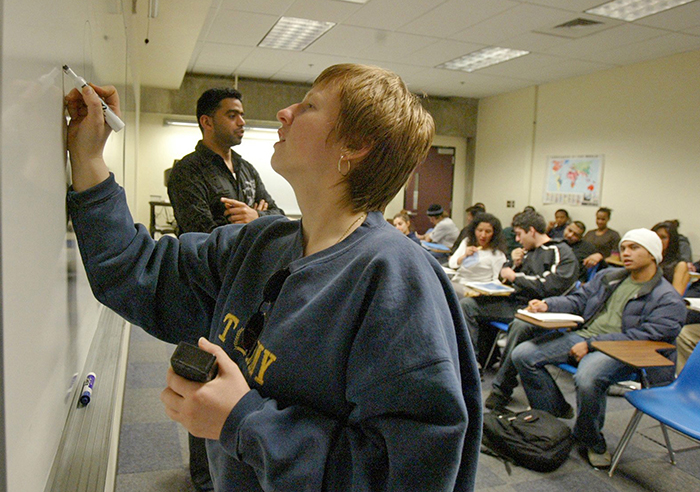More students should study Arabic
Students are not utilizing campus resources to learn Arabic although speakers are in high demand, one columnist argues
GREG GILBERT | Tribune News Service
Student Diane Haugsvar, foreground, draws on the board during Fahad al-Balushi’s Arabic class at Bellevue Community College in Bellevue, Washington.
June 21, 2017
In an increasingly globalized economy, knowing a foreign language is more necessary than ever. Arabic particularly lacks engagement among most of the WSU community, despite the many resources available.
Arabic ranks as the fourth most spoken tongue on the planet, with 467 million speakers, according to The Washington Post.
Arabic language instructor Manal Shaheen wrote, “there is a high demand for Arabic speakers in the U.S., which motivates the department [of Foreign Languages and Culture] to offer [Arabic] again,” for the first time since 2015.
WSU’s Department of Foreign Languages and Cultures website currently lists seven languages: Chinese, French, Italian, German, Japanese, Russian and Spanish.
Arabic has been taught on and off since 2004. However, until this month, Arabic lacked its own course code, Shaheen explained via email. Previously, Arabic fell under the prefix of “FOR LANG” in the WSU course catalog, along with Korean, which clouded the awareness of Arabic’s presence for many students.
Alas, Arabic now has its own prefix. Arabic 101 and 203 are available this fall, and in the spring, Arabic 102 and 204 will be available as well. However, too few students are harnessing this lucrative opportunity that could add to a minor in either Asian Studies or Global Studies.
“From experience, there is a desire from people around to learn the language,” Muslim Student Association (MSA) President Adel Almesmari wrote. “However, it has not been communicated to them about the opportunity offered.”
Speakers are in vigorous demand in both the public and private sectors. The entanglement of international relations with the Arabic-speaking world connects a multitude of career opportunities for political science and history majors. Cougs studying international business and engineering also stand to gain in the energy-rich, Arabic-speaking region of the Middle East, which has been eagerly attempting to diversify its economies in recent years.
The capacity for Cougs to study Arabic reaches beyond the typical classroom. Any student wields the ability to enjoy free Arabic language and culture classes administrated by MSA in the CUB.
“It is interactive and a friendly environment,” Almesmari wrote. “There are no grades as well, as it is a place to make friends.”
Breaking the class routine with consistent access to native speaker engagement goes to show just how largely untapped the resources at WSU are for this invaluable language’s resources. Additionally, the Language Learning Resource Center offers free tutoring in Arabic three days a week.
An intrinsic component of learning a foreign language ought to enrich one’s global understanding. Arabic effectively furnishes just that by cultivating appreciation toward cultures with some of the most pivotal contributions to human progress, as well as insight to the second largest religion in the world.
“[Arabic] helps breaking any communication or cultural barriers, as well as facilitating making friends from all over the globe,” Almesmari wrote.
Study abroad options listed by WSU’s International Programs include colorful and unique Arabic-speaking nations, such as Jordan or the United Arab Emirates. The wide-ranging possibilities of engaging with fellow Arabic speakers skyrocket after graduation as well because of the large number of speakers and accelerating demand.
Humankind is rapidly constructing bridges across its civilizations. It’s essential Cougs pursue a hand in that, and studying Arabic is one of the best ways to help accomplish it.










